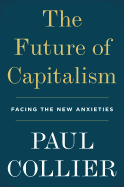
Capitalism is worth saving, economist Paul Collier argues in his provocative treatise The Future of Capitalism: Facing the New Anxieties.
Collier (The Bottom Billion) eschews what he calls the enemies of progress--ideology and populism--for a pragmatic, evidence-based approach that attempts to answer why capitalism has gone askew in the last 50 years and what can be done to right the ship. Wide-ranging, the book touches upon fiscal policy, geopolitics, education, trade and a host of other issues.
Collier's initial diagnosis is that growing inequality in the world, especially in the developed world, is a result of failed policies across the political spectrum. He argues the left has propped up a vacuous paternalist state that has failed to help the most vulnerable, while the right has touted a detrimental market fundamentalism that has put huge swaths of people in economic devastation. His answer is to return to the communitarian ideal of social democracy that drove economic growth from the end of World War II through 1970. He calls this political philosophy "social maternalism," a concept that focuses on using both private and public resources to cultivate and nourish upward mobility. One of the best examples of social maternalism is a set of proactive policies for single, low-income mothers that offers mentoring and counseling instead of punitive state action.
Throughout the book, Collier passionately argues for a shared identity and a return to "reciprocal obligations," an ethical citizenry helping each other in the civic process. The Future of Capitalism will spark plenty of debate and enliven our political discourse. --Scott Neuffer, writer, poet, editor of trampset

